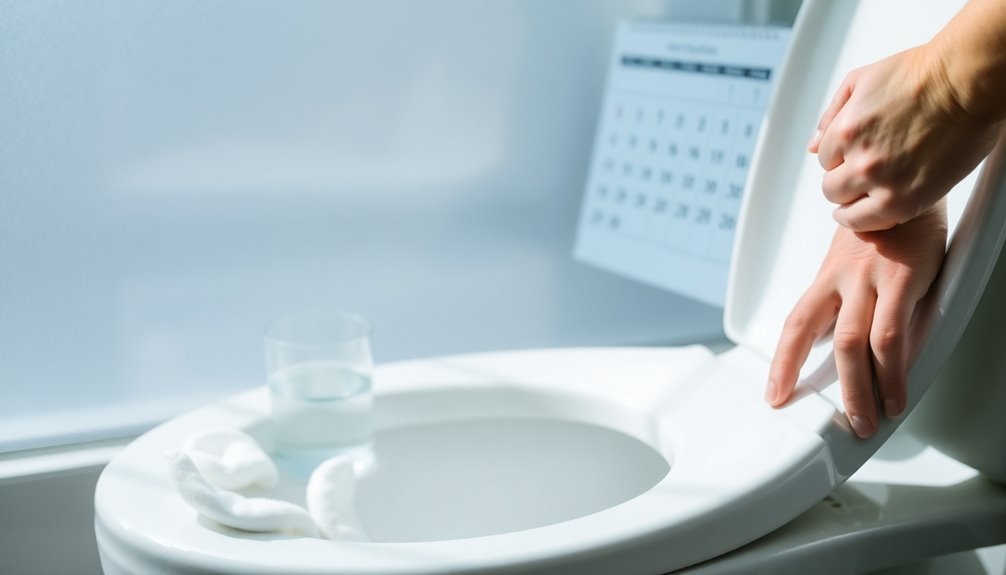You shouldn't have sex if you're dealing with a UTI. Engaging in sexual activity can irritate your urinary tract and worsen symptoms like burning and discomfort. Plus, introducing new bacteria during sex may lead to reinfection or even serious complications, such as kidney infections. It's best to hold off until all symptoms have fully resolved and you've waited a few extra days. If you're unsure about when to resume intimacy safely, there are alternative ways to maintain closeness without aggravating your condition. You'll also find helpful tips on prevention and recovery in what follows.
Key Takeaways
- It is advised to avoid sexual activity until all UTI symptoms fully resolve to prevent worsening discomfort and irritation.
- Engaging in sex can introduce new bacteria, increasing the risk of reinfection or complications like kidney infections.
- Urinating before and after intimacy can help flush out bacteria and reduce UTI symptoms.
- Consider alternative forms of intimacy, such as manual or oral stimulation, to maintain connection without aggravating the UTI.
- Open communication with your partner about health status is essential for prioritizing comfort and consent during this time.
Understanding UTIs

When you understand urinary tract infections (UTIs), it becomes clear why they can be so uncomfortable.
UTIs are caused by bacteria, primarily Escherichia coli, which often comes from the gastrointestinal tract. Women are more susceptible due to their shorter urethras, making it easier for bacteria to enter the urinary tract.
Engaging in sexual activity can aggravate symptoms and increase the risk of developing a UTI, even though they aren't considered sexually transmitted infections. Certain contraceptives and inadequate hygiene practices can also elevate this risk.
You should be mindful that vaginal sex could introduce more bacteria, leading to further discomfort.
Maintaining proper hydration and hygiene is essential to minimize your risk of a UTI and help keep your urinary tract healthy.
Symptoms of UTIs

Understanding UTIs helps you recognize their symptoms, which can be quite distressing. You might experience a persistent urge to urinate and a burning sensation during urination. Pelvic discomfort often accompanies these feelings, greatly affecting your quality of life. Other UTI symptoms include cloudy urine, strong odors, and, in severe cases, blood in your urine.
| Common Symptoms | Severe Symptoms | Accompanying Issues |
|---|---|---|
| Burning sensation | Blood in urine | Fever |
| Persistent urge to urinate | Abdominal pain | Chills |
| Pelvic discomfort | Mood changes | |
| Cloudy urine | Irritability |
If you notice fever or chills, it may indicate a progressing infection. Recognizing these symptoms early can help you seek appropriate treatment.
Risks of Sexual Activity

If you're considering sex while dealing with a UTI, you should know the risks involved.
Engaging in sexual activity can worsen your symptoms, causing more discomfort and potentially allowing bacteria to spread between partners.
Additionally, the friction can irritate your urinary tract, increasing the chance of further complications.
Increased Infection Severity
Engaging in sexual activity while dealing with a UTI can considerably worsen your symptoms, leading to increased pain and discomfort.
The friction and irritation from penetrative sex can exacerbate the symptoms of a UTI, making recovery more challenging. Additionally, introducing new bacteria during sex can increase the risk of further complications, pushing bacteria deeper into your urinary tract. This can lead to more severe issues, like kidney infections.
You might find that the recovery time is prolonged due to heightened irritation and exposure. Although not classified as STIs, the bacteria causing UTIs can be transmitted between partners, particularly from the anus to the vaginal opening or penis, further complicating your situation.
It's best to prioritize your health during this time.
Bacterial Transmission Risks
Sexual activity during a UTI carries significant bacterial transmission risks that can complicate your recovery.
Engaging in anal sex or vaginal intercourse can push existing bacteria deeper into your urinary system, increasing the risk of complications like kidney infections.
While UTIs aren't classified as sexually transmitted infections, you can still introduce new bacteria during sexual activity, potentially leading to reinfection.
This risk heightens with friction during penetrative sex, which may irritate sensitive tissues, intensifying discomfort and pain associated with the infection.
It's vital to recognize that the bacteria responsible for UTIs, like Escherichia coli, can easily transfer between partners, making caution essential to avoid worsening your urinary tract infection and prolonging your recovery time.
Discomfort During Intercourse
Experiencing discomfort during intercourse while dealing with a UTI is common, as the infection can heighten sensitivity in the pelvic area and urethra.
Engaging in sexual activity often leads to increased pelvic pain and irritation, making penetration uncomfortable. Friction can exacerbate these symptoms, causing pain during urination and a burning sensation.
Additionally, the introduction of bacteria during intercourse can push existing bacteria deeper into the urinary tract, raising the risk of kidney infections and prolonging recovery.
This discomfort may lead you to temporarily lose interest in sexual activity until the infection resolves.
It's essential to prioritize your health and consider avoiding sexual activity while experiencing these symptoms to prevent further complications.
Recommendations for Engaging in Sex

When dealing with a UTI, it's wise to prioritize your comfort and health before considering any intimate activities.
It's generally recommended to avoid sex until your UTI symptoms fully resolve, as engaging in sexual activity can introduce bacteria and exacerbate discomfort.
If you decide to be intimate, make certain to urinate before and after to help flush out bacteria and prevent reinfection.
Consider alternative forms of intimacy, like manual or oral stimulation, to maintain your connection without irritating your urinary tract.
Open communication with your partner about your health status and any discomfort is essential to guarantee a safe and consensual experience during this time.
Safe Resumption of Activities

When you're ready to resume sexual activities after a UTI, timing is key—wait until symptoms are completely gone for a few days.
Open communication with your partner is essential to guarantee both of you feel comfortable and safe.
You might also consider alternative intimacy options that won't irritate your recovery, keeping the connection alive while you heal.
Timing for Resuming Sex
To guarantee a safe resumption of sexual activities after a urinary tract infection (UTI), it's important to wait until all symptoms have completely resolved for at least a few days.
Make sure you've completed the full course of antibiotics to confirm the infection is fully treated. It's generally best to avoid penetrative sex for two weeks to minimize the risk of reinfection.
Instead, consider engaging in non-penetrative activities to maintain intimacy during your recovery.
- Monitor for any recurrence of UTI symptoms
- Prioritize comfort and communication
- Stay hydrated to support healing
- Practice good hygiene before intimacy
- Consult your healthcare provider if unsure
Importance of Communication
Resuming sexual activities after a UTI requires more than just physical readiness; open communication with your partner is key.
Discuss your comfort levels and any ongoing symptoms to set clear boundaries regarding intimacy. If you experience pain during urination or intercourse, it's crucial to express this to avoid further discomfort.
Discussing the risks of introducing bacteria during sexual activity can help create a supportive environment during your recovery.
Exploring alternative forms of intimacy that don't involve penetration can maintain your connection while ensuring you don't exacerbate UTI symptoms.
Regular check-ins about how you're feeling can ease anxiety for both you and your partner, making the shift back to intimacy more manageable and enjoyable.
Alternative Intimacy Options
While steering through intimacy after a UTI, consider embracing alternative options that maintain your connection without risking discomfort. Open communication with your partner about boundaries is essential to guarantee a pleasant experience.
Engaging in non-penetrative activities can help you both feel close without exacerbating UTI symptoms. Here are some alternative intimacy ideas:
- Mutual touching
- Kissing and cuddling
- Manual stimulation
- Massage
- Using lubrication to reduce irritation
These activities can foster intimacy while avoiding the risks associated with penetrative sex until all UTI symptoms have resolved.
Prioritize comfort and connection, and remember that exploring alternative intimacy can strengthen your bond during recovery.
Recognizing When to Seek Help

How can you tell when a UTI requires immediate medical attention? If you experience severe symptoms like back, side, or abdominal pain, it may indicate a kidney infection, and you should seek medical attention right away.
Additionally, noticing blood in your urine, chills, or fever signals a more serious infection that needs urgent care. If you have persistent UTI symptoms after finishing antibiotics, it's vital to schedule a follow-up consultation to check for complications or reinfection.
Nausea or vomiting accompanying UTI symptoms also requires urgent medical evaluation. For those with recurrent UTIs, regular check-ups help monitor your urinary health and identify any underlying issues.
Don't ignore these warning signs; they're important for your well-being.
Complications From Untreated UTIS

Ignoring a urinary tract infection (UTI) can lead to serious complications that affect your overall health.
If left untreated, you might experience:
- Kidney infections (pyelonephritis) leading to permanent damage
- Bloodstream infections (urosepsis), a life-threatening condition
- Recurrent infections that cause persistent symptoms
- Antibiotic-resistant bacteria making future infections harder to treat
- Chronic infections requiring more aggressive interventions
Approximately 20% of women with untreated UTIs develop kidney infections, which can present with symptoms like fever, chills, and flank pain.
Delaying medical attention increases your risks considerably.
It's vital to address a UTI promptly to avoid these complications and guarantee your well-being.
Don't take chances—seek help if you suspect you have a urinary tract infection.
Prevention Tips for Future Infections

After considering the serious complications that can arise from untreated UTIs, it's clear that taking preventive measures is essential for your health. Here are some effective prevention tips to help you avoid urinary tract infections:
| Prevention Tip | Description | Benefits |
|---|---|---|
| Urinate Before & After Sex | Helps flush out bacteria from the urinary tract | Reduces UTI risk |
| Maintain Good Hygiene | Wash the genital area with mild soap before sex | Prevents bacteria transfer |
| Stay Well-Hydrated | Drink plenty of water for regular urination | Cleanses the urinary tract |
| Avoid Irritants | Skip douches and scented soaps | Maintains a healthy vaginal environment |
| Practice Safe Sex | Use protection during sexual activity | Minimizes UTI risk |
Frequently Asked Questions
Is It OK to Have Sex With a UTI?
It's best to avoid sex if you're experiencing a UTI. Engaging in sexual activity can worsen your symptoms and introduce more bacteria, prolonging your recovery.
Instead, focus on alternative forms of intimacy that don't involve penetration, like cuddling or gentle massage. Communicating with your partner about your discomfort is essential.
Waiting until you feel better won't only promote healing but also guarantee a more enjoyable experience when you're ready to be intimate again.
Can You Have Sex While on Antibiotics?
You'd think taking antibiotics is the green light for all activities, right? Not quite!
While you're on antibiotics, it's best to wait until your symptoms are gone. These meds can mess with your body's natural balance, possibly leading to discomfort or even a yeast infection.
Plus, some antibiotics might interfere with birth control. So, take a breather and consult your healthcare provider for the best advice tailored to your situation.
What Should You Not Do When You Have a UTI?
When you have a UTI, avoid engaging in penetrative sexual activity, as it can irritate your urinary tract and worsen symptoms.
Don't use vibrators or sex toys, since they can introduce bacteria.
It's also important not to switch between vaginal and anal intercourse without cleaning, which can spread bacteria.
Don't hold in urine during intimacy, and steer clear of douches or scented products that can disrupt your natural flora and exacerbate irritation.
Should I Take a Break From Sex if I Have a UTI?
Imagine you're in a new relationship, but you've suddenly developed a UTI. You might wonder if you should take a break from sex.
It's best to hit pause during this time. Engaging in sexual activity can worsen your discomfort and lead to complications.
Instead, focus on non-penetrative intimacy to keep the connection alive. Wait until you're fully healed and your doctor gives the green light before resuming any sexual activity.
Conclusion
When dealing with a UTI, it's important to prioritize your health. Did you know that nearly 50% of women will experience a UTI in their lifetime? Engaging in sex while infected can worsen symptoms and lead to complications. If you're experiencing discomfort, it's best to wait until you're fully healed before resuming sexual activity. Always listen to your body and seek medical advice if symptoms persist. Taking these steps can help you stay healthy and prevent future infections.










